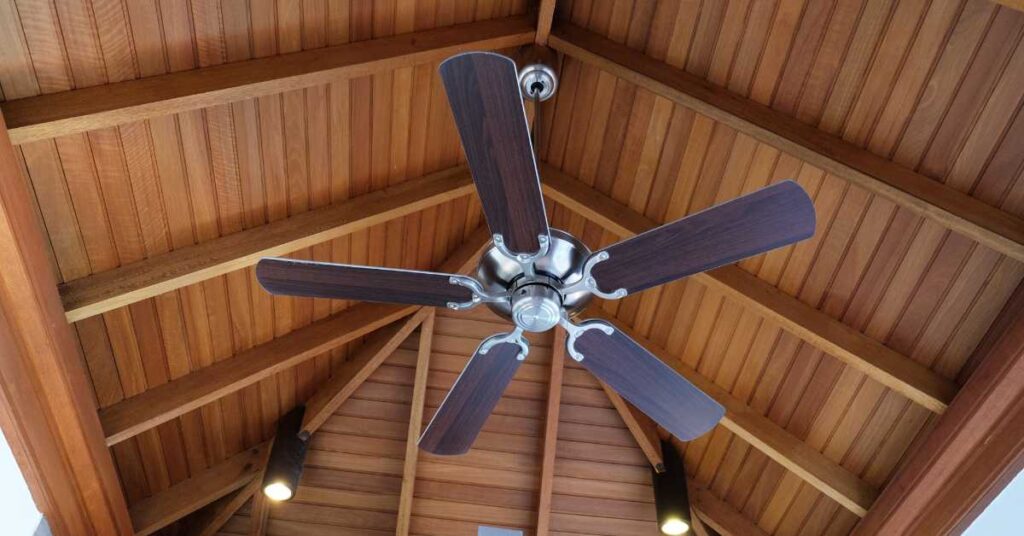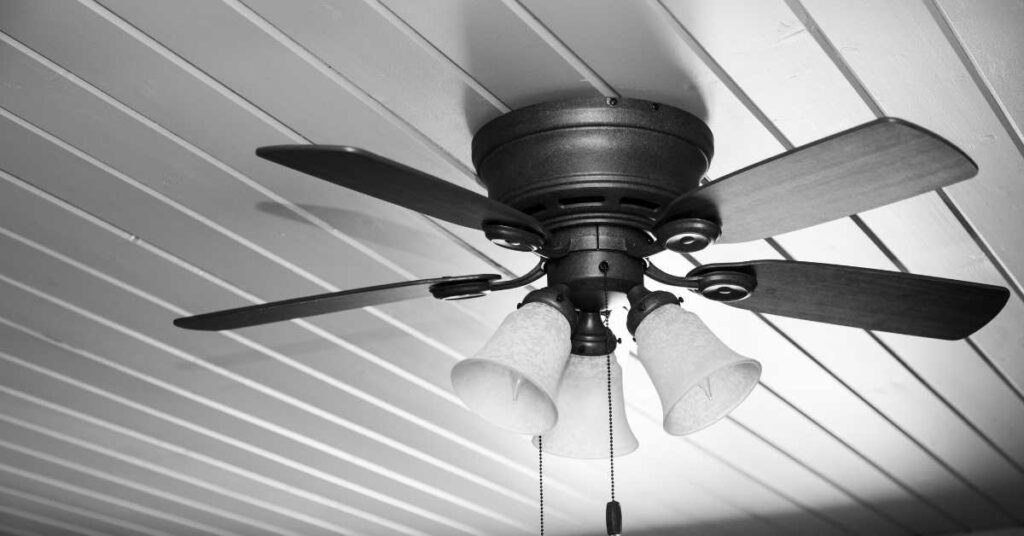Are ceiling fans a good investment? Yes, ceiling fans are a good investment. Not only do they provide a stylish addition to your home decor, but they can also help you save money on your energy bills.
Ceiling fans are an excellent way to keep your home cool during the summer months without relying solely on your air conditioning system. They work by circulating the air in your home, creating a wind-chill effect that makes you feel cooler. This means you can turn up your thermostat a few degrees and still feel comfortable, which can save you money on your energy bills. Plus, ceiling fans are relatively inexpensive to operate, costing just a few cents per hour to run.
Key Takeaways
- Ceiling fans are a good investment for your home.
- Ceiling fans can help you save money on your energy bills.
- Ceiling fans are an inexpensive way to keep your home cool during the summer months.

Understanding Ceiling Fans
When it comes to cooling your home, ceiling fans can be a great investment. However, before you make a purchase, it’s important to understand how they work and what benefits they offer.
Ceiling fans work by creating a wind-chill effect, which helps to cool your body by evaporating sweat and increasing air circulation. They don’t actually lower the temperature of a room, but they can make it feel cooler and more comfortable.
Here are some key things to keep in mind when considering a ceiling fan:
- Size Matters: Ceiling fans come in a variety of sizes, so it’s important to choose the right one for your space. A fan that’s too small won’t be effective, while one that’s too large can be overwhelming and create too much airflow.
- Blade Pitch: The angle of the blades, or blade pitch, can affect the amount of air that’s moved by the fan. A steeper pitch can create more airflow, but it can also be noisier and less efficient.
- Speed Settings: Most ceiling fans come with multiple speed settings, which can help you customize the level of airflow in your space. Keep in mind that higher speeds can be noisier and use more energy.
- Directional Settings: Many ceiling fans come with a switch that allows you to change the direction of the blades. In the summer, you’ll want the blades to rotate counterclockwise to create a cooling breeze. In the winter, you can switch the direction to clockwise to help circulate warm air.
Overall, ceiling fans can be a great investment for your home, providing a cost-effective and energy-efficient way to stay cool and comfortable. By understanding how they work and what features to look for, you can choose the right fan for your space and enjoy all of the benefits that come with it.
The Role of Ceiling Fans in Energy Efficiency
Ceiling fans are an excellent investment for any home, not only because they provide a stylish and comfortable way to cool down, but also because they can help reduce energy costs. Here are a few ways that ceiling fans can improve energy efficiency:
Reducing Air Conditioning Costs
Ceiling fans work by circulating air in a room, creating a wind chill effect that makes you feel cooler. By using a ceiling fan in conjunction with an air conditioner, you can raise the thermostat by a few degrees without sacrificing comfort. This can lead to significant energy savings over time.
According to the Department of Energy, using a ceiling fan in conjunction with an air conditioner can allow you to raise the thermostat by up to 4°F without reducing comfort levels. This can result in a savings of up to 30% on your air conditioning costs.
Improving Heating Efficiency
Ceiling fans can also be used to improve heating efficiency during the winter months. By reversing the direction of the fan blades, you can push warm air down from the ceiling and into the room, reducing the need for additional heating. This can result in energy savings of up to 10%.
It’s important to note that ceiling fans do not actually heat a room. Instead, they help distribute warm air more evenly, making it feel warmer without actually increasing the temperature.
In summary, ceiling fans are an excellent investment for any home looking to improve energy efficiency. By reducing air conditioning costs and improving heating efficiency, ceiling fans can help you save money on your energy bills while keeping your home comfortable year-round.

Factors to Consider When Investing in Ceiling Fans
When it comes to investing in ceiling fans, there are several factors that you should take into consideration. Here are three key factors to keep in mind:
Cost of Ceiling Fans
The cost of a ceiling fan can vary widely depending on factors such as the size, style, and features of the fan. While it may be tempting to opt for a cheaper fan, keep in mind that a higher-quality fan may provide better performance and last longer. It’s also important to factor in the cost of installation, which can vary depending on the complexity of the job and whether you hire a professional or install the fan yourself.
Installation Expenses
Installing a ceiling fan can be a DIY project, but it’s important to have the right tools and knowledge to ensure that the fan is installed safely and correctly. If you’re not comfortable with electrical work or don’t have the necessary tools, it’s best to hire a professional to install the fan for you. Keep in mind that installation costs can vary depending on the complexity of the job and the hourly rate of the installer.
Maintenance and Repair Costs
While ceiling fans are generally low-maintenance, they do require some upkeep to ensure that they continue to operate smoothly and efficiently. This may include cleaning the blades and motor housing periodically, as well as oiling the motor bearings. If your fan does require repairs, it’s important to have it serviced by a professional to ensure that it’s repaired correctly and safely.
In summary, when investing in a ceiling fan, it’s important to consider the cost of the fan itself, as well as the cost of installation and ongoing maintenance. By taking these factors into account, you can make an informed decision about which fan is the best fit for your needs and budget.
Longevity and Durability of Ceiling Fans
Ceiling fans are a long-term investment, and it is important to consider their longevity and durability before purchasing one.
Here are some factors to keep in mind:
- Lifespan: Generally, you can expect a ceiling fan to last for 6 to 10 years, with an average of 8 years. However, some fans can last up to 15-16 years before needing repair or replacement. The lifespan of a ceiling fan depends on several factors, including the quality of its components, the frequency of use, and the maintenance it receives.
- Quality: The quality of a ceiling fan’s components can significantly impact its lifespan and durability. Look for a fan with a sturdy motor, high-quality blades, and durable housing. A fan with a sealed motor is also a good choice, as it will require less maintenance and last longer.
- Maintenance: Regular maintenance can help extend the lifespan of your ceiling fan. This includes cleaning the blades and housing regularly, oiling the motor (if necessary), and tightening any loose screws or bolts. It is also important to use the fan properly, such as not running it at high speed for extended periods of time.
- Warranty: A good warranty can provide peace of mind and protect your investment. Look for a fan with a warranty of at least 1-2 years, and make sure to read the fine print to understand what is covered.
Overall, a ceiling fan can be a good investment if you choose a high-quality model and take care of it properly. By considering factors such as lifespan, quality, maintenance, and warranty, you can ensure that your fan will last for many years and provide efficient cooling and air circulation.

Ceiling Fans and Property Value
Installing ceiling fans in your property can be a great investment not only for its energy-saving benefits but also for its potential to increase your property value. Ceiling fans can add a touch of elegance and style to any room, making it more attractive to potential buyers or renters.
I know that when my wife and I were looking for a house a few years ago that it was a huge plus to have ceiling fans already installed. I know that ceiling fans are not hard to install but it saves time to already have the wiring there if you want to upgrade them in the future.
Ceiling fans can also make your property more appealing to renters. Tenants are often looking for properties that are energy-efficient and cost-effective, and ceiling fans can help with both. They can help reduce energy costs and can also extend the life of your HVAC system by reducing the workload.
In addition to their practical benefits, ceiling fans can also enhance the aesthetic appeal of your property. They come in a variety of styles, sizes, and finishes, making it easy to find one that complements your property’s decor.
Overall, installing ceiling fans in your property is a smart investment that can increase its value and appeal to potential buyers or renters.
Frequently Asked Questions
Do ceiling fans actually save money on energy bills?
Yes, ceiling fans can save you money on your energy bills. By circulating the air in a room, ceiling fans can make you feel cooler and more comfortable, allowing you to turn up your air conditioning or thermostat. This can result in energy savings and lower utility bills.
What are the benefits of installing a ceiling fan?
Ceiling fans offer a variety of benefits. They can help you save money on your energy bills, improve air circulation and ventilation, provide additional lighting, and add a decorative element to your room. Additionally, many ceiling fans come with features such as remote control, adjustable speed settings, and reversible blades, making them a versatile and convenient addition to your home.
Are there any downsides to using a ceiling fan?
While ceiling fans offer many benefits, there are also some potential downsides to consider. Ceiling fans can be noisy, especially at higher speeds, which can be a nuisance for some people. Additionally, ceiling fans can be a safety hazard if they are not installed properly or if they are used improperly.
How do I choose the right size ceiling fan for my room?
Choosing the right size ceiling fan for your room is important to ensure optimal performance and comfort. To determine the appropriate size for your room, measure the length and width of the room and use the following guidelines:
- For rooms up to 75 square feet, choose a fan with a blade span of 36 inches or less.
- For rooms up to 144 square feet, choose a fan with a blade span of 36 to 42 inches.
- For rooms up to 225 square feet, choose a fan with a blade span of 50 to 54 inches.
What is the average lifespan of a ceiling fan?
The average lifespan of a ceiling fan can vary depending on factors such as usage, maintenance, and quality of the fan. However, with proper care and maintenance, a ceiling fan can last for many years. On average, a well-maintained ceiling fan can last between 10 and 15 years.
Can a ceiling fan be used in conjunction with air conditioning?
Yes, a ceiling fan can be used in conjunction with air conditioning to improve air circulation and create a more comfortable environment. By using a ceiling fan, you can reduce your reliance on air conditioning and potentially save money on your energy bills.
Final Thoughts
In conclusion, investing in a ceiling fan can be a smart decision for many homeowners. While they may not be necessary for every home, there are several benefits that make them worth considering.
Firstly, ceiling fans are an affordable way to cool down a room without having to rely on expensive air conditioning. They consume far less power than air coolers and air conditioners, making them a cost-effective solution for those looking to save on their monthly electricity bills.
Additionally, ceiling fans can add aesthetic appeal to a room. They look great in almost any space and can serve as a focal point for your ceiling, adding some much-needed visual interest to an otherwise bland area.
Another benefit of ceiling fans is that they can help you sleep better. The gentle hum of a ceiling fan can serve as white noise, which can be soothing and help you fall asleep faster. Plus, the cool breeze can keep you feeling comfortable all night long.
While ceiling fans may not be as popular as they once were, they are still a practical and stylish addition to any home. Whether you’re looking to save money on your electricity bill or simply want to spruce up a room, a ceiling fan is a good investment to consider.

